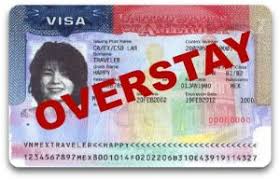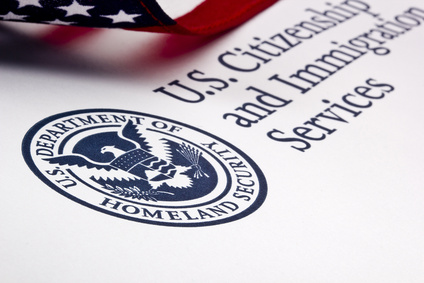POSTING DATE: February 25, 2019
Learn More About:
Immigration News & Updates eNewsletter © 2011 - 2019
For questions about U.S. Residency, Green Cards and Immigration Visas, Visit our Website at: www.ImmigrateToday.com or call our office at: (954) 382-5378
Check Out This Cool Stuff For Immigrants....
Immigration
Questions & Answers
This Week's Immigration News
Question: Hi there. My son is a us citizen and last year he filed papers to sponsor me and his father. He filled out the complete form and put both our information on it but now the immigration says that the case is only for me, not his father. The approval receipt only had my son’s and my name and when my son called the immigration, they said only one person was sponsored on the form. He told them that he included all my information in the spouse section, but they said that is not enough. He got a letter from the visa center and he called them to see if they could add my husband at this point and they said no, the case is just for me. We are so upset and confused and don’t know what we did wrong. Is there really no way to add my husband to the case now?
Answer: No, unfortunately, even though a U.S. Citizen can sponsor their parents, both parents are not included on the same application. Parents are in a special category of immigrants called “Immediate Relatives” (Spouses, Parents and Minor Children of U.S. Citizens) which have the benefit of being exempt from quotas (waiting lines), but the drawback is that family members sponsored in this category can only immigrate alone and cannot bring “dependents” such as a spouse or minor children. This applies to your case. When a U.S. Citizen child sponsors a parent, only the parent named in the petition is sponsored and any spouse the parent has, even the child’s own biological parent is not included. The only way to sponsor the spouse of a parent is to file a separate petition to sponsor that parent. It is true that the form I-130 requests information about the parent’s spouse and children, but not to enable them to immigrate along with the parent, rather simply for technical informational purposes. To sponsor your husband, your son will need to file a separate form I-130 for him, just like he did for you.
Helpful Immigration Tips You Can Use...
Immigration News & Updates eNewsletter
eNewsletter
Filing A Freedom of Information Act (FOIA) Request
Can Get You Copies Of Your Immigration File
It’s always good to have copies of all your documents, however most immigrants don’t make a copy before filing an application with the USCIS. When this happens, filing a Freedom of Information Act (FOIA) request with federal immigration authorities can be very useful to obtain critical information on an individual’s immigration history and even some documents to prove legal entry, when the I-94 card or old passport has been lost over the years.
The good news is that for those who are not in legal immigration status, a FOIA request does not trigger any kind of negative action on an immigrant’s case. The key to success is to provide full and complete information to enable the agency to locate the file and any related case information pertaining to the applicant.
Use The New Online USCIS Filing Fees Calculator To Determine The Correct Filing Fees
Filing immigration applications with the incorrect filing fee is the leading cause of case rejections by the USCIS. This can be inconvenient and sometimes very serious for certain applications which have filing deadlines. As a result, the USCIS just launched a new Online Fee Calculator to assist customers in calculating the correct fee amounts to include when filing their forms. The Online Fee Calculator asks users to select a form, or combination of forms, and then to answer a series of questions. The tool then calculates the correct fee amount that the filer must submit, based upon his or her answers and can be accessed by both computer and mobile devices.
What Are The Real Consequences For Overstaying A U.S. Visa?
USCIS Ends Policy Of Denying Travel Permit Renewals For Immigrants
Who Travel Abroad While Application Pending
Until recently, without any legal justification, the USCIS had been denying pending travel permit renewal applications, called “Advance Parole” (form I-131) when an Immigrant filed a renewal, then traveled abroad using the current unexpired travel permit.
This situation created chaos and confusion for many immigrants with current unexpired travel permits, who needed to renew the permit and did so several months prior to the current travel permit’s expiration. The result was denial of the pending travel permit renewal application.
With illegal immigration and the border wall in the news almost daily, it’s easy to overlook the fact that the majority of immigrants inside the U.S. who lack immigration status actually came here legally on a visa and simply overstayed. But of course you never hear about that because Trump doesn’t care about facts when it comes to immigration.
According to Department of Homeland Security (DHS) statistics, of the approximate 53 million foreign visitors who legally entered the U.S. in 2017, more than 600,000, overstayed their visas by the end of that year. This is similar to years past and likely to current numbers, which will be reported by the DHS next year.
Immigration How To:
How Do I Get A Copy Of My Immigration File?
The top fifteen countries with the most overstays includes: Brazil, Canada, China, Colombia, Dominican Republic, France, Germany, India, Jamaica, Mexico, Nigeria, Philippines, Spain, U.K., Venezuela. So clearly, according to statistics by his own government agencies, Trump’s obsession with the wall and focusing on immigrants from Mexico and other Latin American countries coming in through our southern border is absurd. No doubt because Trump would rather hear his supporters chanting “build the wall”, rather than “stop those tourists”. In order to curb the number of visa overstays, the DHS has stepped up its efforts in the past several years by more extensive screening at airports and ports of entry, which includes searching electronic devices and social media to confirm the purpose of an individual’s visit to the U.S., calling family members and others listed as contacts by the visitor and even sending follow up email reminders that the period of stay will soon expire. These days, it’s not unusual for visitors to receive much less than six months authorized periods of stay, with some as little as several weeks.
So what happens when an individual overstays a visa? Well, there are different consequences for those who overstay and remain in the U.S., than for those that overstay and then later leave the U.S.. Of course the best option is always to avoid overstaying a visa at all costs. For visitors, this usually means making sure to double-check the I-94 printout on the Customs and Border Patrol website to be certain to leave the U.S. before the stay expires and to avoid filing any immigration application to extend or change status in the U.S.. Such applications usually take up to six months to process, going past the applicant’s “authorized period of stay” and when denied, leave the individual with no options. Further, under the new NTA policy, when an application to extend or change status is denied, the USCIS now initiates deportation proceedings against the applicant. Those legally in the U.S. on work and investment type visas should file for renewal six months in advance and use premium processing when available, so that they remain in legal status during the renewal process. This keeps options open in case a renewal is denied, allowing the individual to perhaps file another type application to stay in legal status.
Individuals who overstay a visa by even one day, automatically lose visa status (called “Visa Voidance”) and once they leave the U.S., cannot re-enter without reapplying for a new visa at the U.S. Consulate abroad. And of course obtaining a new U.S. visa after an overstay is a very difficult, if not impossible task, which can lead to successive visa denial for many years to come.
Those who overstay and then remain in the U.S. for a period of time before leaving face much tougher consequences and are barred from returning to U.S. for 3-10 years, depending on the period they overstayed. Here’s a rundown:
• 3-year bar: When an individual overstays in the U.S. for six months or more, once they leave they are barred from reentering the U.S. for three years from their date of departure.
3-year bar: When an individual overstays in the U.S. for six months or more, once they leave they are barred from reentering the U.S. for three years from their date of departure.
• 10-year bar: When an individual overstays in the U.S. for one year or more, once they leave they are barred from reentering the U.S. for ten years from their date of departure.
10-year bar: When an individual overstays in the U.S. for one year or more, once they leave they are barred from reentering the U.S. for ten years from their date of departure.
• Bar to Change of Status/Extension of Stay: When an individual overstays in the U.S., even by one day after their authorized period of stay, they become ineligible to extend their stay in the U.S. or change their status to another nonimmigrant status. The only immigration option is obtaining residency through a real marriage to a U.S. Citizen.
Bar to Change of Status/Extension of Stay: When an individual overstays in the U.S., even by one day after their authorized period of stay, they become ineligible to extend their stay in the U.S. or change their status to another nonimmigrant status. The only immigration option is obtaining residency through a real marriage to a U.S. Citizen.
Clearly, overstaying a U.S. visa has unwelcome consequences which take effect immediately upon the first day of overstay, so the best way to avoid that is to preplan your immigration options far in advance of your visa expiration.
Download a free copy of your I-94 card now
Recently the USCIS announced a change in policy, once more going back to its previous policy of allowing Immigrants to travel on unexpired travel permits while a renewal was pending, by adding the following to the USCIS website page under the “Special Instructions” section of Form I-131, Applications for Travel Document: “an individual may have an approved advance parole document while a second one is pending. Individual may travel on the approved advance parole document, provided the document is valid for the entire duration of the time abroad.”
Read the USCIS policy change
New Application Form to Extend/Change Nonimmigrant Status Required Beginning March 11th
The USCIS has announced that a new revised Form I-539, Application to Extend/Change Nonimmigrant Status with the edition date of 02/04/19 will be required, beginning March 11, 2019. Older versions of the form filed on or after that date will be rejected. The new version will also have a supplement, called Form I-539A, which will require all family members (called “co-applicants”) included on the primary applicant’s Form I-539 to sign and pay an $85 biometric services fee. Currently, biometrics are not required for most I-539 applications.
Applicants should keep in mind that under the new NTA rule, applicants (and family members) filing Form I-539 applications who receive denials, will likely also receive deportation notices as well. As a result, tourists visiting the U.S. should be very careful about the decision to file to change status to say and F-1 student visa or to request an extension of stay in the U.S., since doing so and being denied could result in deportation and at the least, cancellation of your tourist visa.
Question: My husband and I filed for my residency back in 2017, but we haven’t had our interview yet, still waiting. I read where you said its taking a long time now. The problem is that its been so long that my work permit is expiring and I need to renew it, so my question is whether I need to send a fee with my renewal I-765 application? Can you please also tell me what other things I need to send with the application? Thanks.
Answer: These days, it is not unusual for it to take from one to two years for a family based residency interview to be scheduled, so of course, most immigrants need to renew their work and travel permits during the process. I always advise filing the work permit at least 180 days (6 months) before it expires and the travel permit at least 150 days (5 months), since it now take so long for work and travel permit renewal processing. You do not need to pay the work permit (EAD) renewal fee, since your original I-485 fees included all renewals. Include the form I-765, a copy of the front and back of your current EAD card, copy of the I-485 receipt, copy of your passport Biographic page and 2 passport photos.
Question: I have been in the U.S. since 2005. My mom filed for me back in 2007 but the case got denied because my i-94 had expired. The problem is that at my interview in 2008 the officer took my original i-94 and I never made a copy. All these years later, I got married to my us wife and we filed for my green card in 2013 but the case was denied even before the interview because I didn’t have the i-94 card! In 2016 I filed to get another i-94 but immigration denied my application because they said I didn’t give them enough information. I feel like everything is against me! My wife and I want to try to file for my green card again, but we want to do it right this time so I don’t get deported. Can you please get me my i-94 and file for my residency?
Answer: Yes, I understand exactly what you have been going through. It is very common for immigrants to lose, misplace or even have their I-94 card taken by immigration, which leaves them without any way to file for residency. Not to worry, I will do several things to get your case going, first, we will properly file a new request for a duplicate I-94 card with your complete information. Processing time takes several months. Second, I’ll file a Freedom of Information request called a “FOIA” with the Department of Homeland Security to obtain a copy of your immigration file. The processing time can take several months or more, but the results should provide us with a copy of your I-94 all most of your immigration-related documents as well. Once we have either a copy of your I-94 or the duplicate original, we can file your residency case.
Visit the new Online Fee Calculator
Depending on an immigrant’s particular case, documentation may sometimes be held by various government agencies, including: U.S. Citizenship and Immigration Services (USCIS), Customs and Border Protection (CBP), Department of State (DOS), the Executive Office of Immigration Review (EOIR), and, for some, the Federal Bureau of Investigations (FBI). In these cases, a separate FOIA must be requested from each agency separately.












